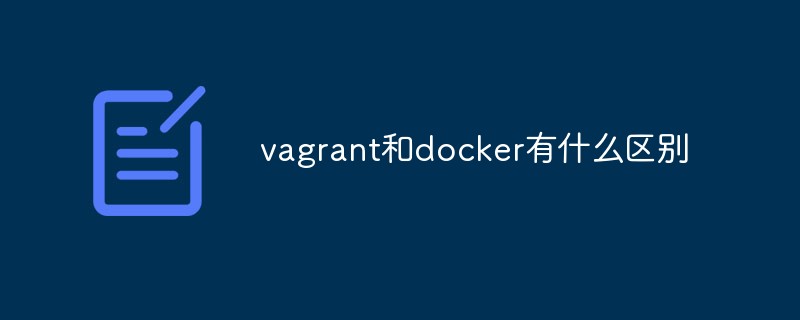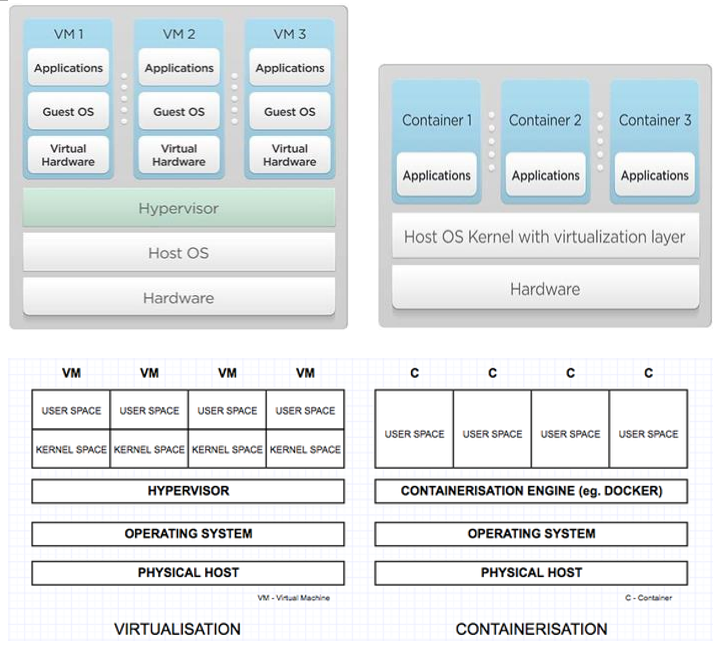What is the difference between vagrant and docker
Difference: 1. Docker is an open source application container engine and a deployment tool for the running environment; while Vagrant is a deployment tool for the development environment. 2. Docker is suitable for managing application environments, while Vagrant is suitable for managing virtual machines.

The operating environment of this tutorial: linux5.9.8 system, docker-1.13.1 version, Dell G3 computer.
Docker
Introduction to Docker
- Docker - HomePage
- Overview
Docker is an open source application container The engine is based on Go language and complies with the Apache2.0 protocol and is open source.
Docker allows developers to package their applications and dependencies into a lightweight, portable container, and then publish it to any popular Linux machine, which can also be virtualized.
Containers completely use the sandbox mechanism and will not have any interfaces with each other (similar to iPhone apps). More importantly, the container performance overhead is extremely low.
Docker application scenarios
- Automated packaging and publishing of Web applications.
- Automated testing, continuous integration and release.
- Deploy and adjust databases or other back-end applications in service-based environments.
- Compile from scratch or extend an existing OpenShift or Cloud Foundry platform to build your own PaaS environment.
Advantages of Docker
Simplify the process:
Docker allows developers to package their applications and dependencies into one Virtualization can be achieved by publishing to any popular Linux machine in a portable container.
Docker has changed the way of virtualization, allowing developers to directly put their results into Docker for management.
Convenience and speed are already the biggest advantages of Docker. Tasks that used to take days or even weeks can be completed in just a few seconds under the processing of Docker containers.Avoid choice phobia:
If you have choice phobia, be a veteran patient. Docker helps you package your troubles!
The Docker image contains the running environment and configuration, so Docker can simplify the deployment of multiple application instances. For example, web applications, background applications, database applications, big data applications such as Hadoop clusters, message queues, etc. can be packaged into a mirror for deployment.Saving expenses:
The advent of the cloud computing era frees developers from the need to configure expensive hardware in order to pursue effects. Docker has changed the mindset that high performance must be high price.
The combination of Docker and the cloud allows the cloud space to be more fully utilized. It not only solves the problem of hardware management, but also changes the way of virtualization.
Vagrant
Vagrant Introduction
Vagrant is a lightweight, highly reusable and portable Development environment tools.
It can be simply understood that Vagrant abandons all the troublesome settings in the development environment, but replaces it with a single configuration file, and can selectively retain the required features.
Vagrant uses Oracle's open source VirtualBox virtualization system by default and uses Chef to create an automated virtual environment.
Functional features of Vagrant
- Supports quick creation of virtual machines
- Supports quick setting of port forwarding
- Supports customization Image packaging (original image method, incremental patch method)
- Basically all the basic configurations that can be used daily can be quickly set
- Supports automatic running commands at boot
- Yes Write your own extension
Compare Docker and Vagrant
Vagrant is based on Virtualbox’s virtual machine to build your development environment, while Docker is based on LXC (LXC) lightweight container virtualization technology.
Vagrant is the deployment tool for your development environment; and docker is the deployment tool for your running environment.
Vagrant is suitable for managing virtual machines, while docker is suitable for managing application environments. 
Recommended learning: "docker video tutorial"
The above is the detailed content of What is the difference between vagrant and docker. For more information, please follow other related articles on the PHP Chinese website!

Hot AI Tools

Undresser.AI Undress
AI-powered app for creating realistic nude photos

AI Clothes Remover
Online AI tool for removing clothes from photos.

Undress AI Tool
Undress images for free

Clothoff.io
AI clothes remover

AI Hentai Generator
Generate AI Hentai for free.

Hot Article

Hot Tools

Notepad++7.3.1
Easy-to-use and free code editor

SublimeText3 Chinese version
Chinese version, very easy to use

Zend Studio 13.0.1
Powerful PHP integrated development environment

Dreamweaver CS6
Visual web development tools

SublimeText3 Mac version
God-level code editing software (SublimeText3)

Hot Topics
 1377
1377
 52
52
 Agile development and operation of PHP microservice containerization
May 08, 2024 pm 02:21 PM
Agile development and operation of PHP microservice containerization
May 08, 2024 pm 02:21 PM
Answer: PHP microservices are deployed with HelmCharts for agile development and containerized with DockerContainer for isolation and scalability. Detailed description: Use HelmCharts to automatically deploy PHP microservices to achieve agile development. Docker images allow for rapid iteration and version control of microservices. The DockerContainer standard isolates microservices, and Kubernetes manages the availability and scalability of the containers. Use Prometheus and Grafana to monitor microservice performance and health, and create alarms and automatic repair mechanisms.
 Pi Node Teaching: What is a Pi Node? How to install and set up Pi Node?
Mar 05, 2025 pm 05:57 PM
Pi Node Teaching: What is a Pi Node? How to install and set up Pi Node?
Mar 05, 2025 pm 05:57 PM
Detailed explanation and installation guide for PiNetwork nodes This article will introduce the PiNetwork ecosystem in detail - Pi nodes, a key role in the PiNetwork ecosystem, and provide complete steps for installation and configuration. After the launch of the PiNetwork blockchain test network, Pi nodes have become an important part of many pioneers actively participating in the testing, preparing for the upcoming main network release. If you don’t know PiNetwork yet, please refer to what is Picoin? What is the price for listing? Pi usage, mining and security analysis. What is PiNetwork? The PiNetwork project started in 2019 and owns its exclusive cryptocurrency Pi Coin. The project aims to create a one that everyone can participate
 How to install deepseek
Feb 19, 2025 pm 05:48 PM
How to install deepseek
Feb 19, 2025 pm 05:48 PM
There are many ways to install DeepSeek, including: compile from source (for experienced developers) using precompiled packages (for Windows users) using Docker containers (for most convenient, no need to worry about compatibility) No matter which method you choose, Please read the official documents carefully and prepare them fully to avoid unnecessary trouble.
 How to use PHP CI/CD to iterate quickly?
May 08, 2024 pm 10:15 PM
How to use PHP CI/CD to iterate quickly?
May 08, 2024 pm 10:15 PM
Answer: Use PHPCI/CD to achieve rapid iteration, including setting up CI/CD pipelines, automated testing and deployment processes. Set up a CI/CD pipeline: Select a CI/CD tool, configure the code repository, and define the build pipeline. Automated testing: Write unit and integration tests and use testing frameworks to simplify testing. Practical case: Using TravisCI: install TravisCI, define the pipeline, enable the pipeline, and view the results. Implement continuous delivery: select deployment tools, define deployment pipelines, and automate deployment. Benefits: Improve development efficiency, reduce errors, and shorten delivery time.
 Deploy JavaEE applications using Docker Containers
Jun 05, 2024 pm 08:29 PM
Deploy JavaEE applications using Docker Containers
Jun 05, 2024 pm 08:29 PM
Deploy Java EE applications using Docker containers: Create a Dockerfile to define the image, build the image, run the container and map the port, and then access the application in the browser. Sample JavaEE application: REST API interacts with database, accessible on localhost after deployment via Docker.
 Questions and Answers on PHP Enterprise Application Microservice Architecture Design
May 07, 2024 am 09:36 AM
Questions and Answers on PHP Enterprise Application Microservice Architecture Design
May 07, 2024 am 09:36 AM
Microservice architecture uses PHP frameworks (such as Symfony and Laravel) to implement microservices and follows RESTful principles and standard data formats to design APIs. Microservices communicate via message queues, HTTP requests, or gRPC, and use tools such as Prometheus and ELKStack for monitoring and troubleshooting.
 How to install Docker extension in vscode Steps to install Docker extension in vscode
May 09, 2024 pm 03:25 PM
How to install Docker extension in vscode Steps to install Docker extension in vscode
May 09, 2024 pm 03:25 PM
1. First, after opening the interface, click the extension icon button on the left 2. Then, find the search bar location in the opened extension page 3. Then, enter the word Docker with the mouse to find the extension plug-in 4. Finally, select the target plug-in and click the right Just click the install button in the lower corner
 PHP microservice containerized monitoring and log management practice
May 08, 2024 pm 12:06 PM
PHP microservice containerized monitoring and log management practice
May 08, 2024 pm 12:06 PM
PHP microservice containerized monitoring and log management monitoring: Use Prometheus and Grafana to monitor resource usage, number of requests, and latency. Log management: Use ELKStack (ElasticSearch, Logstash, Kibana) to collect, parse and visualize logs. Deploy the Filebeat agent to send logs to ElasticSearch.




